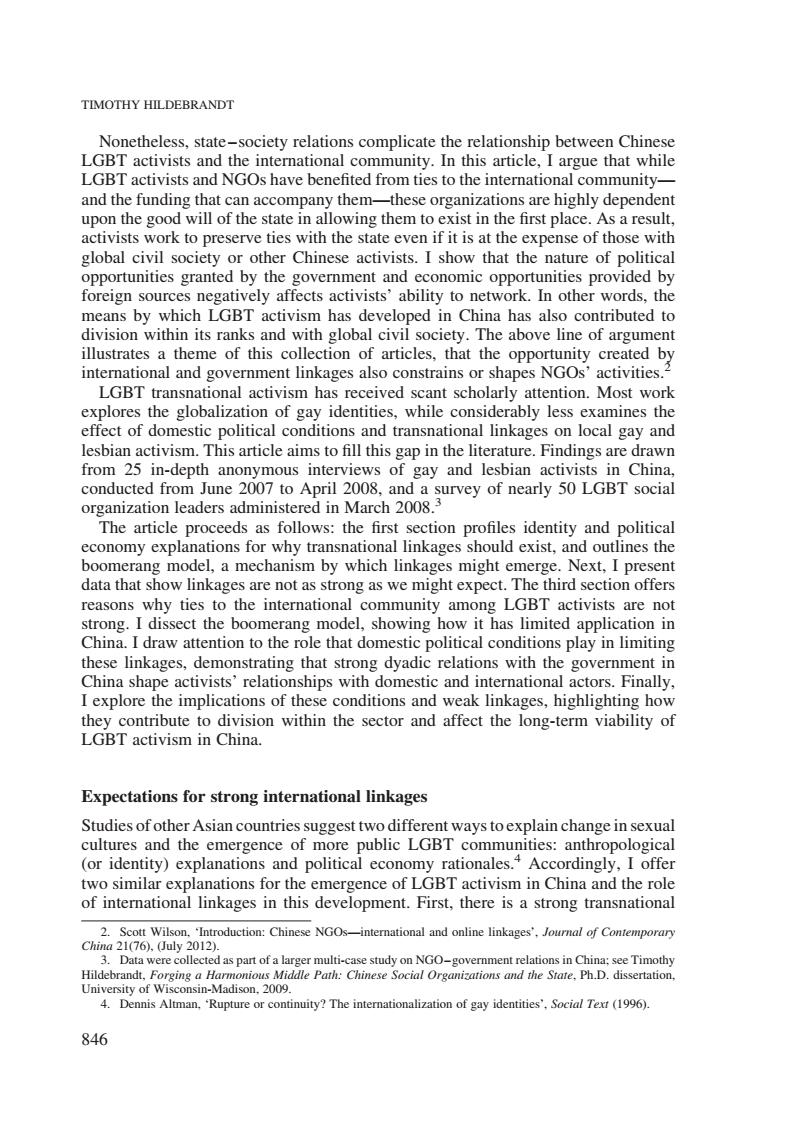正在加载图片...

TIMOTHY HILDEBRANDT Nonetheless,state-society relations complicate the relationship between Chinese LGBT activists and the international community.In this article,I argue that while LGBT activists and NGOs have benefited from ties to the international community- and the funding that can accompany them-these organizations are highly dependent upon the good will of the state in allowing them to exist in the first place.As a result, activists work to preserve ties with the state even if it is at the expense of those with global civil society or other Chinese activists.I show that the nature of political opportunities granted by the government and economic opportunities provided by foreign sources negatively affects activists'ability to network.In other words,the means by which LGBT activism has developed in China has also contributed to division within its ranks and with global civil society.The above line of argument illustrates a theme of this collection of articles,that the opportunity created by international and government linkages also constrains or shapes NGOs'activities. LGBT transnational activism has received scant scholarly attention.Most work explores the globalization of gay identities,while considerably less examines the effect of domestic political conditions and transnational linkages on local gay and lesbian activism.This article aims to fill this gap in the literature.Findings are drawn from 25 in-depth anonymous interviews of gay and lesbian activists in China, conducted from June 2007 to April 2008,and a survey of nearly 50 LGBT social organization leaders administered in March 2008.3 The article proceeds as follows:the first section profiles identity and political economy explanations for why transnational linkages should exist,and outlines the boomerang model,a mechanism by which linkages might emerge.Next,I present data that show linkages are not as strong as we might expect.The third section offers reasons why ties to the international community among LGBT activists are not strong.I dissect the boomerang model,showing how it has limited application in China.I draw attention to the role that domestic political conditions play in limiting these linkages,demonstrating that strong dyadic relations with the government in China shape activists'relationships with domestic and international actors.Finally, I explore the implications of these conditions and weak linkages,highlighting how they contribute to division within the sector and affect the long-term viability of LGBT activism in China. Expectations for strong international linkages Studies of other Asian countries suggest two different ways to explain change in sexual cultures and the emergence of more public LGBT communities:anthropological (or identity)explanations and political economy rationales.*Accordingly,I offer two similar explanations for the emergence of LGBT activism in China and the role of international linkages in this development.First,there is a strong transnational 2.Scott Wilson."Introduction:Chinese NGOs-international and online linkages',Journal of Contemporary China 21(76).(July 2012). 3.Data were collected as part of a larger multi-case study on NGO-government relations in China;see Timothy Hildebrandt,Forging a Harmonious Middle Path:Chinese Social Organizations and the State.Ph.D.dissertation. University of Wisconsin-Madison.2009. 4.Dennis Altman,'Rupture or continuity?The internationalization of gay identities',Social Texr (1996) 846Nonetheless, state –society relations complicate the relationship between Chinese LGBT activists and the international community. In this article, I argue that while LGBT activists and NGOs have benefited from ties to the international community— and the funding that can accompany them—these organizations are highly dependent upon the good will of the state in allowing them to exist in the first place. As a result, activists work to preserve ties with the state even if it is at the expense of those with global civil society or other Chinese activists. I show that the nature of political opportunities granted by the government and economic opportunities provided by foreign sources negatively affects activists’ ability to network. In other words, the means by which LGBT activism has developed in China has also contributed to division within its ranks and with global civil society. The above line of argument illustrates a theme of this collection of articles, that the opportunity created by international and government linkages also constrains or shapes NGOs’ activities.2 LGBT transnational activism has received scant scholarly attention. Most work explores the globalization of gay identities, while considerably less examines the effect of domestic political conditions and transnational linkages on local gay and lesbian activism. This article aims to fill this gap in the literature. Findings are drawn from 25 in-depth anonymous interviews of gay and lesbian activists in China, conducted from June 2007 to April 2008, and a survey of nearly 50 LGBT social organization leaders administered in March 2008.3 The article proceeds as follows: the first section profiles identity and political economy explanations for why transnational linkages should exist, and outlines the boomerang model, a mechanism by which linkages might emerge. Next, I present data that show linkages are not as strong as we might expect. The third section offers reasons why ties to the international community among LGBT activists are not strong. I dissect the boomerang model, showing how it has limited application in China. I draw attention to the role that domestic political conditions play in limiting these linkages, demonstrating that strong dyadic relations with the government in China shape activists’ relationships with domestic and international actors. Finally, I explore the implications of these conditions and weak linkages, highlighting how they contribute to division within the sector and affect the long-term viability of LGBT activism in China. Expectations for strong international linkages Studies of other Asian countries suggest two different ways to explain change in sexual cultures and the emergence of more public LGBT communities: anthropological (or identity) explanations and political economy rationales.4 Accordingly, I offer two similar explanations for the emergence of LGBT activism in China and the role of international linkages in this development. First, there is a strong transnational 2. Scott Wilson, ‘Introduction: Chinese NGOs—international and online linkages’, Journal of Contemporary China 21(76), (July 2012). 3. Data were collected as part of a larger multi-case study on NGO–government relations in China; see Timothy Hildebrandt, Forging a Harmonious Middle Path: Chinese Social Organizations and the State, Ph.D. dissertation, University of Wisconsin-Madison, 2009. 4. Dennis Altman, ‘Rupture or continuity? The internationalization of gay identities’, Social Text (1996). TIMOTHY HILDEBRANDT 846